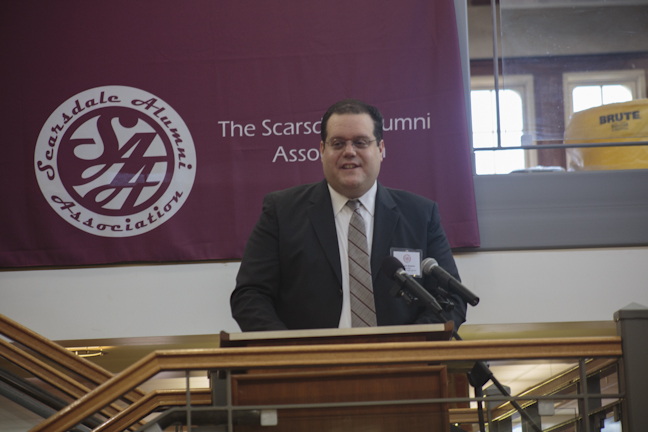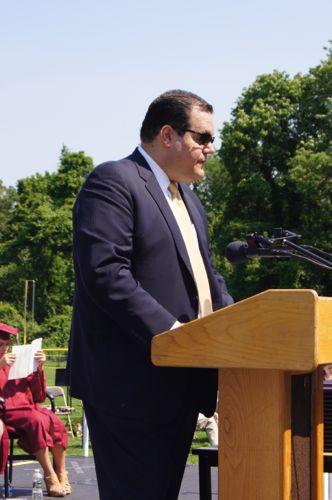SHS Principal Ken Bonamo Looks Back and Forward
- Category: Schools
- Published: Tuesday, 20 August 2013 10:40
 SHS Principal Kenneth Bonamo has recently completed his first year in Scarsdale. He came to the suburbs from an urban environment where he served as the Principal of Townsend Harris High School in Queens. He seems to have embraced all aspects of the job and is frequently seen at school events and school board meetings and delivered a moving address at the SHS commencement exercises in June on the power of love.
SHS Principal Kenneth Bonamo has recently completed his first year in Scarsdale. He came to the suburbs from an urban environment where he served as the Principal of Townsend Harris High School in Queens. He seems to have embraced all aspects of the job and is frequently seen at school events and school board meetings and delivered a moving address at the SHS commencement exercises in June on the power of love.
Steven Friedman, a 2013 graduate of SHS reached out to Bonamo to hear his thoughts on his first year in Scarsdale, including the impact of Sandy Hook, testing and the mission of the school. Here is what he shared:
What did you think of your first year at Scarsdale High School?
It was a year in which I learned a lot about our faculty, students, parents, and community. When taking on this leadership role, I knew my first goal was not to mess anything up. Scarsdale High School has an incredible history and functions rather well because of all that had been in place for years and the many people who work here. We certainly had a number of unexpected situations which were tremendous learning experiences. In terms of curriculum, we were able to move forward with some of the work on interdisciplinary initiatives by having teachers develop and offer new courses that really pull from two different departments. So much work had been done on interdisciplinary work and I think there was a real concern that it would wither from inattention, so I am happy with how we were able to carry that forward. Being surrounded with so many talented professionals and serving such wonderful students is really motivating on a daily basis.
How is SHS different from other schools where you've worked previously, and have those differences had any effect on your role as  principal?
principal?
The main difference is the pace, which is breathtaking. We have extremely talented teachers working with high-achieving students in a community with high expectations. This means that not a moment is wasted in the day. Also, the support from the district office is much more evident. In New York City, the upper administration is far removed from the schools, and the frequent reorganizations prevented meaningful relationships from developing. Here, the close proximity allows for those deep conversations and thoughtful actions. The communities are obviously different, but then again similar in the desire for achievement and success--and the challenge of defining exactly what success means for different students in different contexts. The highlight for me in both settings is to work with brilliant faculty members to make students' experiences even richer, and working with students whose eager enthusiasm illuminates and energizes the school. That's what keeps me going.
What changes in school policy should we expect to see in the coming year?
I don't anticipate any changes in school policy. As situations arise, we deal with them on an individual basis, and if something warrants a full policy review, we do that. At present, there's not an area that has emerged as needing major modification.
What do you think could still use some work? What are the goals driving the administration right now?
I think there is a need to refine our vision, to figure out what students need to succeed both in college and in life in our ever-changing world, and to allow the community to appraise our work given the support provided. In a high-achieving school such as Scarsdale, there is a tendency to keep things as they are because they are working so well-- which is true. However, we know that the world around us is changing in terms of technology, in terms of the problems that need to be solved, in terms of the skills people will need to be attractive candidates for employment or successful entrepreneurs, and to lead fulfilling lives that benefit the greater good. So we may need to refine what we're doing to keep current. The real challenge will be determining what that looks like.
As a school administrator, how did you react when you found out about the tragedy at Sandy Hook?
It was of course very upsetting. To think of it on a personal and emotional level, to picture myself as the principal in such a situation, made it real for me. I think that's how some parents and teachers personalized it as well, by imagining how they would feel if their children or students or colleagues were indiscriminately murdered by a madman. After that initial reaction, we were able to really move thoughtfully through a review of our safety and security procedures. There was pressure from parents and teachers both to react immediately by putting new security in place and also to leave everything as it was. We took the time to listen to as many voices as possible and I think built the closest thing to a consensus we could achieve where we thought one was impossible.
What has SHS done or what will it continue to do in response to the attack?
Starting this September, access to the school will be limited to three designated entrances--by the nurse's office on Post Road, by the auditorium on Brewster Road, and by the gymnasium lobby. These entrances will be staffed by a monitor during school hours who will ensure that everyone who enters is a student or someone with legitimate business in the school. We will still be an open campus for students during they day; they will just have to re-enter through one of these entrances.
What's your view on the new state testing requirements? Will the school soon purchase tablets for every student?
The state tests have really moved away from the true purpose of standardized testing, which is to diagnose student learning needs. Giving tests to students without providing results that allow teachers and parents to identify areas for growth and areas of excellent performance is misguided. The frequent changing of standards further confuses the issue, and then developing educational policy around the idea of using these tests to hold teachers accountable for student performance discounts all the other facets of education, all the other ways students can demonstrate achievement, and all the other things teachers do to enrich their students' lives.
As far as computers, the district is moving towards a bring-your-own-device policy that will encourage students to bring whatever devices they have and access the school's wifi network. That seems to be the trend nationwide.
Have you been involved with programs like Civ Ed previously?
Civ Ed was my first experience with a program that so tightly coordinated English, social studies, and student development. It provides students with an outstanding experience, and I can see why it's been around so long.
Do you or the administration have any ideas about how to make the transition from middle school to high school easier for incoming freshmen?
Our two-day freshman orientation program provides students with the nuts-and-bolts right before they start high school. In 8th grade, we have a morning at the middle school for the students to meet with their high school deans, as well as an evening program for parents. During the freshman year, we have the Civ Ed and Freshman Seminar programs which help students with this transition. Add to these programs the fact that, on the whole, students have been together since kindergarten or sixth grade, and I think you have the makings for a smooth transition. There will always be times of adjustment, and our teachers and deans allow for that and help students when they need it.
Although you already spoke at our graduation ceremony, is there any final advice you want to impart to exiting seniors as they depart for college?
The best advice I can give is to find something that you are passionate about and follow it. Everything falls into place after that. A balance between careful planning and allowing life to happen (i.e. letting yourself live) also helps you to enjoy the ride.














